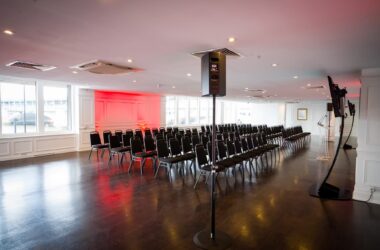Inclusive Venues: A Guide to Accessibility in Event Planning

When it comes to hosting successful events, the venue plays a pivotal role. An inclusive venue not only enhances the experience for all attendees but also reflects a commitment to diversity and accessibility. By prioritising inclusivity, event planners can ensure that everyone, regardless of their abilities, can fully participate and enjoy the event. Here’s how to create an inclusive venue that meets the needs of all guests.
1. Assess Accessibility Features
Start by evaluating the venue’s accessibility features. Here are some key elements to consider:
- Entrances and Exits: Ensure there are accessible entrances with ramps or automatic doors. Verify that pathways are clear and free of obstacles.
- Restrooms: Check for accessible restrooms equipped with grab bars and sufficient space for mobility aids.
- Parking: Look for designated accessible parking spaces close to the venue entrance, clearly marked and compliant with regulations.
- Lifts: If the venue has multiple floors, confirm that lifts are available and easy to locate.
2. Design for Comfort and Safety
A truly inclusive venue should prioritise the comfort and safety of all attendees. Consider the following:
- Seating Arrangements: Offer flexible seating options, including spaces for wheelchairs. Arrange seating in a way that promotes easy movement and interaction.
- Lighting and Acoustics: Ensure that the venue has appropriate lighting for visibility and that sound systems accommodate individuals with hearing impairments. Consider providing assistive listening devices if necessary.
- Emergency Protocols: Develop and communicate clear emergency procedures that cater to individuals with disabilities, ensuring everyone understands how to exit safely in case of an emergency.
3. Incorporate Sensory-Friendly Spaces
Many individuals experience sensory sensitivities, so it’s essential to create spaces that accommodate these needs:
- Quiet Areas: Designate quiet zones where attendees can retreat to reduce sensory overload. These spaces should be comfortable and away from loud noises or bright lights.
- Sensory Tools: Provide sensory tools, such as fidget devices or noise-canceling headphones, for those who may benefit from them.
4. Engage with Diverse Audiences
Involving diverse audiences in the planning process can offer valuable insights into inclusivity. Consider these approaches:
- Seek Feedback: Gather input from individuals with disabilities or those who advocate for them during the venue selection process. Their experiences and suggestions can highlight necessary adjustments.
- Community Partnerships: Collaborate with local organisations that focus on accessibility and inclusivity. They can provide resources and expertise to enhance the event experience.
5. Utilise Technology for Inclusion
Use technology to create a more inclusive experience:
- Virtual Access: Offer hybrid options that allow remote participation, making the event accessible to those who cannot attend in person.
- Real-Time Captioning: Implement real-time captioning services for presentations, ensuring that individuals who are deaf or hard of hearing can follow along.
- Mobile Apps: Develop or use existing apps that provide event information in accessible formats, including schedules, maps, and updates.
6. Promote Cultural Sensitivity
Inclusivity extends beyond physical accessibility to encompass cultural sensitivity:
- Diverse Programming: Ensure that event programming reflects a range of cultural perspectives and experiences, appealing to a broader audience.
- Language Accessibility: Offer translation services or multilingual materials to accommodate non-English-speaking attendees.
Creating an inclusive venue is not just about meeting regulatory requirements; it’s about fostering an environment where everyone feels welcome and valued. By prioritising accessibility in the planning process, event organisers can create experiences that resonate with all attendees, promote social responsibility, and set a standard for future events. Ultimately, an inclusive venue enhances participation, engagement, and enjoyment, making any event more successful and impactful.
Related Posts
10 Common Mistakes to Avoid when Booking a Conference Venue
Booking a conference venue is a crucial step in planning a successful business event. However, many organisers make common mistakes that can lead to logistical problems, increased costs, or a…

Financial District’s Finest: Summer Party Venues for City Firms
Planning a summer party for your City firm? It can feel like a real challenge. You’ve got to stick to a budget, impress the bosses, and sort out all the…

Unique Opportunity to Host Pitch Events at Chelsea FC
Love sport and looking for a truly unique corporate away day? Experience the thrill of hosting Pitch Events at Chelsea FC With late some late availability due to changing match…

The Future of Event Venues: Trends to Watch in 2025
The events industry is constantly evolving, with technological advancements, sustainability initiatives, and changing attendee expectations shaping the future of event venues. As we move deeper into 2025, venues are finding…

